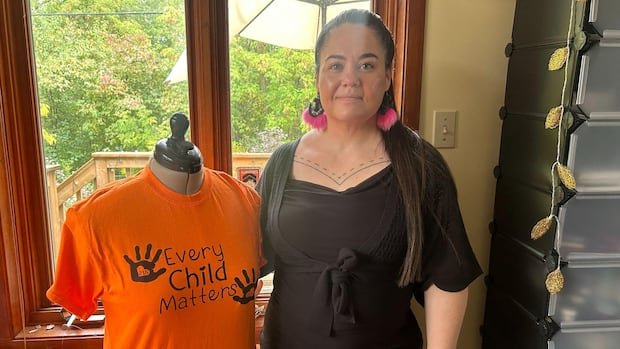Bright orange material drapes the surface of the table in Jennifer Qupanuaq May’s cozy home office located in Pointe-Claire, Montreal. Displayed on a mannequin is one of her handmade shirts bearing the message: “Grandson of a Residential School Survivor.”
Recalling the impact her work had when her daughter wore a similar shirt to school, May emphasized the importance of raising awareness about Indigenous children’s presence in schools. As an artist hailing from Kuujjuaq in northern Quebec’s Nunavik region, May has been crafting orange shirts for the past four years, aiming to initiate crucial conversations within her community.
Orange Shirt Day, observed on September 30 as the National Day for Truth and Reconciliation, encourages individuals nationwide to wear orange in solidarity with Indigenous children who suffered in residential schools. Despite the increasing availability of commercial orange shirts, there are concerns that the profound message they carry may be diluted.
The origin of the orange shirt stems from Phyllis Webstad’s story, a member of the Stswecem’c Xgat’tem First Nation, symbolizing the cultural suppression experienced by generations of Indigenous children in residential schools. This day serves as a poignant reminder of the children lost and the survivors grappling with enduring trauma.
While Indigenous artists initially led the design of orange shirts, the trend has now permeated mainstream markets, sparking debates about the potential loss of significance due to commercialization. Some artists, like Mi’kmaw artist Stephen Jerome, express reservations about the commodification of such a poignant symbol.
May advocates for supporting Indigenous artists directly or opting for plain orange shirts over mass-produced ones from chain stores. On the other hand, some view mass production as a means to amplify the message of Orange Shirt Day. The Orange Shirt Society, founded by Webstad, collaborates with major retailers to enhance visibility and generate funds for survivor support programs.
May continues to create orange shirts as a means of remembrance, education, and community honor, emphasizing her commitment to the cause. Whether crafted in a small home studio or retailed in department stores, the essence of the message – that every child matters – remains paramount and enduring.


